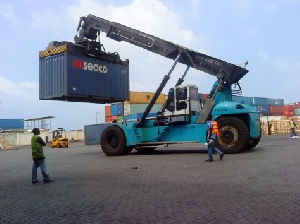The Government of Ghana is losing hundreds of millions of Ghana Cedis a year in unpaid custom duties although, from all indications, Government is gradually running out of cash to fund programmes.
One of the subtle ways in which officials of the Customs, Excise and Preventative Service (CEPS) allow this to happen is to allow goods to be cleared from the port on “Permit”.
Normally, custom duties of CEPS are determined only after there have been an inspection of goods and a Final Classification and Valuation Report (FCVR), has been issued by an appointed inspection company. However, perishable goods such as frozen fish or meat are allowed to be cleared before the classification and valuation report is issued by “permit’. Before goods are cleared on such permits, the importer is required to pay duty on the invoice value of the goods and later when the FCVR is ready, the importer would be required to pay the difference, if there is any.
On other occasions, goods are cleared hurriedly before the inspection report when the importer is able to satisfy CEPS that they need the goods urgently.
What is happening at our ports is that this “permit” system is seriously being abused. Between January 2012 and December 2012 alone, more than GHS 230 million worth of goods were cleared from our ports under permit. However, the companies involved had not returned to pay for the full custom duty as at June 2013. Strangely, officials of CEPS have not ensured that there were follow-ups to recover the outstanding duties from the importers.
What is worse is that although the importers are supposed to pay the invoice (CIF) value of goods cleared under permit, millions of Ghana Cedis worth of dutiable goods, which were cleared under permit, were taxed at rates of below 2%. In 2012 alone, more than Ghc88 million worth of goods, which were cleared under permit, were taxed at less than 2%.
Apart from goods such as books or items imported by diplomatic missions and exempted companies which do not attract any duty, the minimum custom duty is 5% of the value. In addition to this, there are other taxes such as National Health Insurance Levy –NHIL (2.5%); ECOWAS Levy (0.5%); EDIF (0.5%); Processing Fee (1%); Environmental Tax (20%) ; GCNet Charge (0.4%); Destination Inspection Fee (1%); Withholding Tax IRS (1%), etc.
It is mind-boggling how CEPS could have deducted tax of less than 2% after adding all the taxes above. It is believed by insiders with the CEPS that officials arbitrarily waive taxes in order to have their individual pockets lined by importers. The lower the official tax collected, the greater the CEPS Officer’s “goro power”.
Meanwhile, the government is starved of funds for essential development projects.
According to a report prepared by the Commissioner of CEPS, which has been sighted by the Insight, companies that benefited from this over-generous rates of tax included Olam (Ghana) Ltd; Schlumberger Seaco Inc; Amank Agriculture & Equip.; Tullow Ghana Limited; Sinopec International Petroleum Sev; Mobile Zone; Stanbic Bank Ghana; Goldfields Ghana Ltd; Abosso Goldfields Ltd; Golden Star (Bogoso / Prestea); Perseus Mining Ghana Ltd; Church Of Jesus Christ; Redinggton Ltd; Chris Bell Ent; Koby Jones Ent; Fosu Justice; Micfrim Enterprise; Buggies Phone Repaires & Trading; Caital Phones & Accessories; etc.
Between January and April 2013, more than GHS 93 million worth of goods making up (1,170 consignments) was allowed to be cleared under permit. Some of them were taxed as low as less than 0.9%. No attempts have been made to recover the outstanding duties.
It must be said that it is not only private sector companies who get away without paying taxes.
The University of Ghana, the Ghana National Petroleum Corporation and the Police Service also clear goods under permit without returning to pay the substantive duties.
While the Government is yet to know how much custom duty and related taxes are outstanding, the government finds itself hemmed in by workers’ demands for their allowances to be paid.
General News of Sunday, 3 November 2013
Source: Insight Newspaper

















